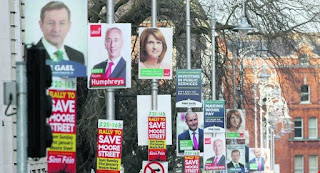It would be nice if the state were to take stock and reset some dials when the pandemic finally runs its course. The state is nearly one hundred years old. The circumstances that prevailed in 1922 do not prevail now. This is a different Ireland, and it needs a different regulatory structure.
The Irish Free State was born from an armed revolution that led to civil war. The traces of that violent birth remain in our institutions. The first governments of the Free State were about consolidating that state against enemies, to borrow a phrase from the USA, both foreign and domestic. Therefore, the balance tilted more towards the institution than the citizen whenever the interests of the two competed.
The state is now as stable as a state can be. The IRA are gone. The state is protected by the European Super State that is currently being born, and that European Super State may be a better bet than China for replacing the USA as the greatest power in the world in a generation or two.
As such, we should now be in a position of sufficient maturity to loosen some of the over-tight bonds, and in a position of sufficient wisdom born from experience, between the financial crash and the pandemic, to see the need for loosening those bonds.
Consider the case of judging the judges. Ireland’s laws regarding freedom of speech are highly restrictive. This restriction acts as a halter on the media’s ability to tell stories fully, which in turn comforts the strong and afflicts the weak.
We’ve seen it in the past fortnight concerning Golfgate and Mr Justice Wolfe. The current issue of The Phoenix details the twenty-year struggle to have a judicial council appointed, a twenty-year struggle that has yet to leave the starting gate. Not good enough. This needs to be fixed as a matter of urgency.
Judicial accountability is just one of a number of major areas of Irish public life that are not scrutinised. The property market and the meat-factory industry are two obvious cases. The communal living scheme is eerily reminiscent of the boom in building two-bedroom apartments with parking for one car of the early 2000s. The two-bedroom apartment is the most profitable type of building for a developer. It is the least useful for families looking for homes. Are we going to make the same mistakes again? If not, what’s going to stop us?
As for the meat factories, the special treatment given to the cause of keeping schools open during the pandemic is certainly understandable, if perhaps not entirely wise. The special treatment afforded the meat factories makes no sense whatsoever. The special treatment is so odd that it resulted in Michael McDowell and Sinn Féin being on the same side of the argument, not something that occurs very often. What’s going on, and why is it going on? A deafening silence from Institutional Ireland.
One of the flaws in Irish political culture is the culture’s emphasis on politics and lack of emphasis on governance. As a people, we revel in stories about strokes and politicians slipping blades between each other’s ribs. Governance – whether the bins should be collected at the start or the end of a week; how best to distribute services, by geography or population; how best to distribute taxes; how best to educate children; how to deal with the left-behind – all these questions bore us rigid. Ireland expects somebody else to worry about that stuff. The part of democracy that demands the sovereign people take responsibility for these decisions is a penny that has yet to drop with the Irish nation.
Perhaps it will drop now. One of the effects of the pandemic is that the nation’s indifference to the spectacular levels of public-service waste is coming home to roost. Why does Ireland lack acute bed capacity? Because acute bed capacity has never been an issue in Irish politics. Every party throws money at the HSE and hopes a miracle will result. They are incapable of doing anything else. Utterly out of their depth.
When Norma Foley announced the balls-up in the Leaving Cert results, who was really surprised? We might not have said it aloud, but nobody really expected that automated system to work. The government got away with it by giving everyone whatever course they wanted. If that has negative consequences, they’ll happen on someone else’s watch, a double-result on any Irish politician’s scorecard.
The most important thing to take from all of this is that it’s not the politician’s fault. It’s out fault for electing them. These are not colonial governors sent from London. These are ourselves, doing things as we, the sovereign people, would have them done.
Therefore, the onus is on the people to change their taste in politics. Politics has to become boring, an accountants’ game of what did you say you’d do, what did you do, how much did it cost, why did it happen, why didn’t it happen and how much did it all cost? The electoral system will have to change too, as it’s inclined to prioritise local over national needs. This will reduce the fun of election counts, but reader, look on the bright side. Maybe you’ll be able to go for a pint again. Wouldn’t that be worth it?


















